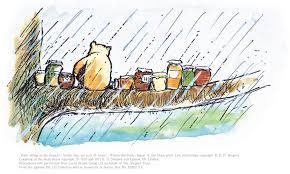What do Winnie the Pooh and Attilla the Hun have in common?
Hint: your six-year-old daughter is more likely to help you with this inquiry than is your friend who has an M.A. in history and a Ph.D. in literature.

Which movies or TV shows—first run or streamed—have an adolescent couple engaging in physical intimacy for the first time without having had a glass of wine or some pot or getting totally and completely blindingly schnockered prior to schmooching? For extra credit, name a popular movie or TV show in which reproductive biology is a topic of conversation. The dictionary should be the only place where “intercourse” comes before “introduction.” Yet there is never a syllable of discussion about sperm and egg. Condoms are well known as the most effective method after abstinence for preventing the spread of STDs, HIV, and unwanted pregnancies. Condoms made from animal intestines date from the 17th century. The first rubber condoms were produced in 1855. Televisions got their start prior to WWII and, from what I understand, are fairly common today. You might think that condoms and screens having proliferated together over time would have some overlap. But you won’t find entertainment mentioning where babies or sexually transmitted diseases come from. Can it be that condoms and screens don’t even know one another?

I can answer the first question above: What do Winnie the Pooh and Attilla the Hun have in common? Same middle name. But I can’t come up with any movies in which young adults have sex for the first time without using drugs or alcohol. “I was so drunk I didn’t know what I was doing” and “I never would have done that if I weren’t stoned” are possible rationales. “I’m nervous and I’m not comfortable with how I look naked” is another. But wouldn’t you prefer the narrative for your young adult children to be something like the following? “I have enjoyed your company and was hoping we could take this to the next level. A committed, monogamous relationship is what I’m looking for. Can we talk about birth control and what we both want out of this step?” Words no adolescent ever spoke.
So instead we get floundering, perfidy, regret, recrimination, accusation, disappointment, and confusion. I want to be careful about poking my nose into anyone’s private affairs. I don’t know everything and I didn’t invent sex. Who am I to say that communication and honesty are preferable to groping, misunderstanding, and unplanned pregnancies? But wouldn’t we prefer happy, thoughtful, mature, good sex for our 20-something children?
The list of folks for whom rectitude and clear messaging were not a thing continues to grow. Don’t the defendants—typically with a ‘y’ chromosome and a position of power—wish in retrospect that they had been more up front, less demanding? Scheming and scamming to get women inebriated so that their judgment is compromised, is abundantly low rent you have to admit. These guys have oodles of cash. Can’t they just take a date to dinner and a movie like the rest of humanity?

The purpose of these columns—number 500 today, I’ll have you know—has always been to engender conversation if not evoke consensus. So let me be explicit about what I’m saying and what I’m not: I’m not presuming to tell anyone what kind of sex to have. I am pointing out that screens influence behavior. That’s why product placement is a thing. There are few models for conversation about birth control on screen and no models for sober sex. That’s why we should help our kids understand good touch versus bad touch when they’re little; how to make their needs and wants known when they’re older; that no means no at every age; and that when they’re ready to be physically intimate, that they don’t have to be shitfaced to do so.


